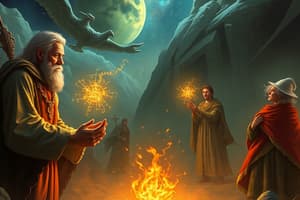Podcast
Questions and Answers
Which scientist is known for developing the laws of planetary motion?
Which scientist is known for developing the laws of planetary motion?
Which Enlightenment thinker believed in the concept of the social contract?
Which Enlightenment thinker believed in the concept of the social contract?
What was a key belief of Rationalism during the Enlightenment?
What was a key belief of Rationalism during the Enlightenment?
Which of the following figures is associated with Enlightened Absolutism?
Which of the following figures is associated with Enlightened Absolutism?
Signup and view all the answers
Which of the following best describes Empiricism?
Which of the following best describes Empiricism?
Signup and view all the answers
Signup and view all the answers
Study Notes
Scientific Revolution and Enlightenment Thinkers
- Natural Philosophy transitioned to a more empirical approach, emphasizing observation and experimentation.
- Francis Bacon: championed empiricism, emphasizing the importance of systematic observation and experimentation in acquiring knowledge.
- Robert Boyle: a key figure in the development of modern chemistry, advocating for experimental methods.
- William Harvey: revolutionized medicine with his discoveries regarding blood circulation.
- Galileo Galilei: used the telescope to observe celestial bodies, supporting a heliocentric model of the universe.
- Nicolaus Copernicus: proposed the heliocentric model, placing the sun at the center of the solar system.
- Tycho Brahe: meticulously recorded astronomical observations, crucial for Kepler's work.
- Johannes Kepler: formulated laws of planetary motion based on Brahe's data, confirming a sun-centered solar system.
- Andreas Vesalius: revolutionized anatomy through detailed observations and dissections.
- Isaac Newton: developed the laws of motion and universal gravitation, unifying terrestrial and celestial mechanics.
- Empiricism: emphasizes experience as the source of knowledge and relies on observation and experimentation to understand the natural world.
- Rationalism: stresses reason as the primary source of knowledge, suggesting that the universe operates according to consistent, discoverable laws.
Enlightenment Thinkers
- Thomas Hobbes: believed in a social contract theory where individuals surrender some freedoms for security under a strong ruler.
- John Locke: advocated for natural rights (life, liberty, and property); influenced later political systems, with his emphasis on individual freedoms.
- Baron de Montesquieu: championed the separation of powers to prevent tyranny in government.
- Jean-Jacques Rousseau: argued for popular sovereignty and the general will as the basis of legitimate political authority.
- Voltaire: advocated reason as a means of addressing social and political issues, and emphasized individual liberties.
- Adam Smith: developed the concept of laissez-faire economics, where government intervention in the economy should be minimal.
- Deism: a philosophical belief emphasizing a rational, distant creator God who does not actively intervene in the universe.
- Enlightened Absolutism: a form of monarchy where rulers tried to use Enlightenment ideas to rule justly and efficiently. Examples include Frederick the Great of Prussia, Catherine the Great of Russia, and Joseph II of Austria.
- Catherine the Great: a Russian empress who implemented some Enlightenment reforms, including legal codes and education.
- Frederick the Great: a Prussian monarch who, to a certain degree, embraced Enlightenment ideals by reforming laws, promoting education, and enacting legal reforms.
- Joseph II: an Austrian emperor who attempted to implement significant reforms influenced by Enlightenment principles.
Impact of Enlightenment Ideas Today
- Enlightenment ideas continue to shape political systems and individual freedoms across the world.
- Concepts like separation of powers and individual rights are central to contemporary democracies.
- Empirical scientific methods are fundamental to modern science.
Studying That Suits You
Use AI to generate personalized quizzes and flashcards to suit your learning preferences.
Description
Explore the pivotal figures of the Scientific Revolution and the Enlightenment in this quiz. Discover how thinkers like Galileo, Copernicus, and Bacon transformed natural philosophy into modern science through empirical methods and groundbreaking discoveries. Test your knowledge on their contributions to science and medicine.




